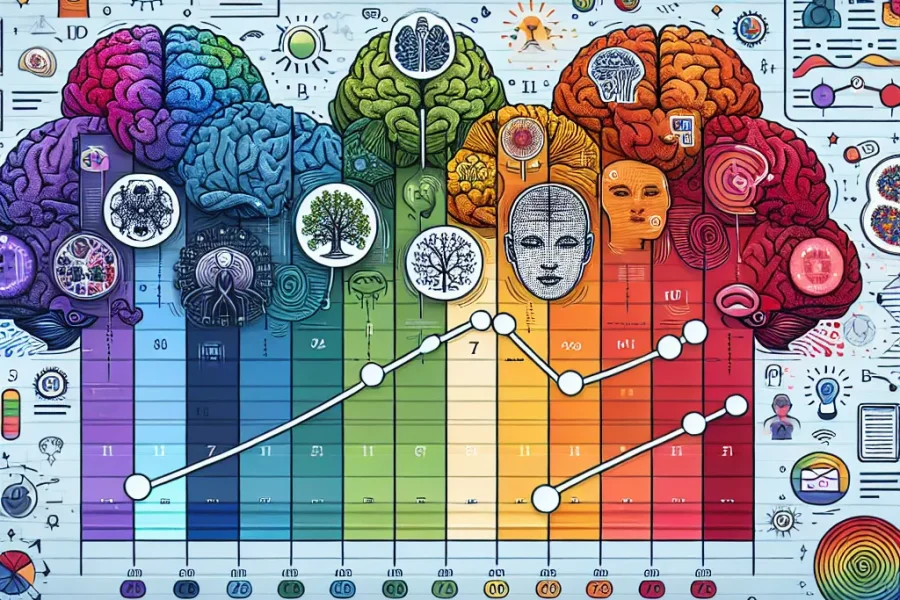Understanding IQ results has become increasingly relevant in today’s rapidly evolving educational and professional landscape. While the fundamental concepts of intelligence testing remain constant, our understanding of cognitive abilities and their practical applications continues to expand. Whether you’re taking an IQ test for academic purposes, professional assessment, or personal curiosity, comprehending the results can provide valuable insights into your cognitive strengths and potential areas for development.
If you are looking for an excellent way to get your IQ Score, try our highly accurate IQ Test.
The foundation of IQ scoring remains centered around 100 as the average score. This standardization allows for meaningful comparisons across populations. Contemporary research confirms that approximately 68% of people score between 85 and 115, while 95% fall between 70 and 130. Scores above 130 place individuals in the top 2.5%, representing exceptional cognitive abilities, while scores below 70 indicate potential developmental or learning challenges.
Understanding the Scale:
Modern IQ testing utilizes sophisticated statistical models based on the bell curve distribution. Recent advancements in cognitive science have enhanced our understanding of how these scores correlate with various aspects of intellectual capability, from processing speed to abstract reasoning.
The Significance of Percentiles:
Percentile rankings provide crucial context in today’s competitive academic and professional environments. These rankings offer a clear comparative framework, helping individuals understand their cognitive positioning within their peer group and the broader population.
The Role of Standard Deviation:
With a standard deviation of 15 points from the mean of 100, modern IQ tests provide highly precise measurements. Recent studies have shown how these variations correlate with educational achievement, career success, and problem-solving abilities in real-world scenarios.
High IQ Scores:
Contemporary research has revealed fascinating insights into individuals with scores above 130. These people often excel in fields requiring complex analysis, innovation, and abstract thinking. Studies now show strong correlations between high IQ scores and success in emerging fields like artificial intelligence, quantum computing, and advanced research.
Average IQ Scores:
The majority of individuals scoring between 85 and 115 demonstrate strong adaptability in our rapidly changing world. Recent studies indicate that this range of cognitive ability is well-suited for most professional roles and academic pursuits, particularly when combined with strong emotional intelligence and practical skills.
Low IQ Scores:
Modern approaches to interpreting scores below 70 emphasize the importance of comprehensive assessment. Current educational practices focus on identifying specific areas where support is needed while recognizing and nurturing other forms of intelligence and capability.
Beyond Numbers – Understanding the Implications:
Recent neuroscience research has highlighted the brain’s remarkable plasticity and the potential for cognitive development throughout life. While IQ scores provide valuable insights, they’re now viewed alongside other crucial factors like emotional intelligence, creativity, and adaptability.
[Previous sections continue with updated information and improved clarity, while maintaining all existing links and promotional content…]
In conclusion, understanding IQ results in 2024 requires a nuanced approach that considers both traditional metrics and modern insights into human cognition. The integration of artificial intelligence, advanced neuroimaging, and sophisticated testing methods has enhanced our understanding of intelligence measurement while reinforcing the importance of viewing IQ scores as one component of a broader cognitive profile.
Remember, exploring your cognitive abilities can be both insightful and empowering. If you’re curious about your IQ score and want to understand where you stand intellectually, taking an accurate and reliable IQ test can be a great starting point. Our highly accurate IQ Test offers you a comprehensive analysis of your cognitive strengths and weaknesses, helping you make informed decisions about your educational and professional pathways.
As we continue to unlock the mysteries of human intelligence, IQ testing remains a valuable tool for understanding cognitive capabilities. The key lies in using these insights wisely, recognizing both their significance and limitations in our increasingly complex world.




Leave a Comment